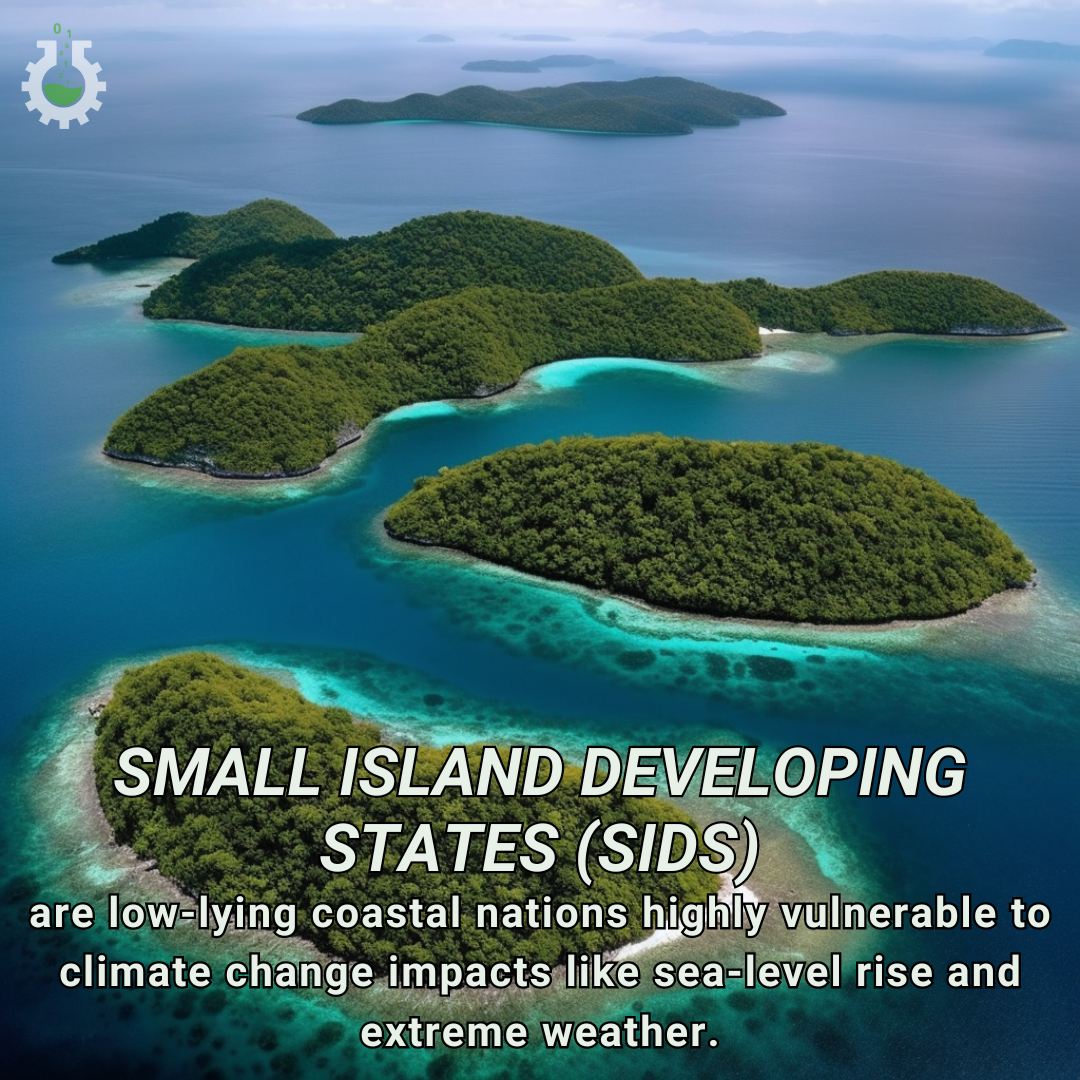June 25, 2024
Climate Change Poster Collection of the Day – Small Island Developing States (SIDS)
Book a Demo
Today’s Climate Change Poster Collection highlights Small Island Developing States (SIDS), a unique group of countries that face disproportionate vulnerabilities to the impacts of climate change, despite contributing minimally to global greenhouse gas emissions. These islands, scattered across the Caribbean, Pacific, and Indian Oceans, are on the front lines of climate change, experiencing firsthand the devastating effects of rising sea levels, increased frequency and intensity of tropical storms, and coral bleaching. The very existence of some SIDS is threatened as sea levels rise, encroaching on coastal communities and critical infrastructure. For instance, nations like Tuvalu and the Maldives face the grim reality of potential submersion within this century. The loss of land not only means the displacement of populations but also the loss of cultural heritage, traditional knowledge, and a way of life that has persisted for generations.
Beyond the immediate physical dangers, climate change poses significant socio-economic challenges for SIDS. Agriculture and fisheries, which many islanders depend on for their livelihoods, are being disrupted by changing weather patterns and ocean acidification. Traditional crops struggle to survive in altered climatic conditions, while fish stocks migrate to cooler waters, making fishing more challenging and less predictable. Additionally, freshwater resources are becoming increasingly scarce due to saltwater intrusion and altered precipitation patterns. Many SIDS rely on rainwater harvesting and limited groundwater reserves, which are now under threat from prolonged droughts and contamination by rising sea levels.
The tourism industry, a vital economic pillar for many SIDS, is also at risk as natural attractions like coral reefs and pristine beaches degrade. Coral reefs, which are biodiversity hotspots and crucial for coastal protection, are experiencing widespread bleaching due to warming ocean temperatures. This not only affects marine life but also diminishes the appeal of these islands as tourist destinations, leading to economic losses and reduced income for local communities. The degradation of natural beauty and biodiversity further exacerbates the vulnerability of SIDS, making it harder to attract tourists and investors.
The cultural heritage and traditional ways of life of island communities are under threat, as climate-induced migration forces people to leave their ancestral lands. This migration, often to urban areas or other countries, leads to the erosion of cultural practices, languages, and social structures that have been the bedrock of island societies. The psychological impact of losing one’s home and way of life cannot be overstated, contributing to mental health challenges and social disintegration.
Despite these challenges, SIDS are not passive victims; they are active advocates for global climate action. Through platforms like the Alliance of Small Island States (AOSIS), they have been instrumental in pushing for ambitious international climate agreements. Their voices have been crucial in highlighting the principle of “common but differentiated responsibilities,” emphasizing that while all countries must act on climate change, those with greater historical emissions should bear a larger share of the burden. SIDS have also been at the forefront of innovative climate solutions, from adopting renewable energy technologies to implementing community-based adaptation projects.
However, the path to resilience requires substantial financial and technical support from the global community. Investments in renewable energy, sustainable infrastructure, and adaptive technologies are crucial for enhancing the resilience of these islands. For instance, transitioning to solar, wind, and geothermal energy can reduce dependency on imported fossil fuels and enhance energy security. Building climate-resilient infrastructure, such as elevated buildings and seawalls, can protect communities from rising seas and extreme weather events. Additionally, investing in early warning systems and disaster preparedness can save lives and reduce economic losses.
International cooperation and funding mechanisms, such as the Green Climate Fund, play a critical role in supporting SIDS’ adaptation and mitigation efforts. However, accessing these funds often involves navigating complex bureaucratic processes, which can be challenging for small nations with limited administrative capacities. Therefore, simplifying access to climate finance and providing technical assistance is essential for enabling SIDS to implement effective climate strategies.
As we confront the global climate crisis, the plight and perseverance of SIDS underscore the urgent need for collective action and equity in addressing climate change. Their experiences serve as a poignant reminder that the impacts of climate change are not distributed equally, and that global solidarity is essential in building a sustainable future for all. The resilience and innovative spirit of SIDS can inspire broader climate action, demonstrating that even the most vulnerable can lead the way in creating a more sustainable and equitable world.
Discover an inspiring collection of climate change poster.



